AI for Wellness: An Effortless Guide to Mastering Your Health
Have you ever felt that modern healthcare is more reactive than proactive? We track calories on one app, log workouts on another, and search for stress-relief techniques on a third, all in disconnected silos. But a fundamental shift is underway. The rise of sophisticated Artificial Intelligence is breaking down these walls, paving the way for a truly integrated and personalized approach to our well-being. This is the era of AI for wellness, a technological revolution that promises to make proactive health management more accessible, intelligent, and tailored to the individual than ever before. This guide will serve as your comprehensive map to this exciting new landscape.
What is AI for Wellness? A Revolution in Personalized Health
At its core, AI for wellness refers to the application of artificial intelligence technologies to improve and maintain personal health, often outside of a traditional clinical setting. Unlike AI in healthcare, which focuses on diagnostics, drug discovery, and hospital management, AI for wellness is about empowering individuals. It’s the smart algorithm in your fitness app, the chatbot that helps you reframe negative thoughts, and the wearable sensor that analyzes your sleep quality.
The primary goal is to move from a one-size-fits-all model to a “segment-of-one” model. Instead of following generic advice, you get recommendations based on your unique data, goals, and preferences. This digital health technology acts as a personal coach, nutritionist, and wellness advisor, available to you 24/7. It achieves this by analyzing patterns in your data that would be impossible for a human to track, creating a feedback loop that helps you understand your body and mind in unprecedented detail.
Using AI to Revolutionize Your Nutrition
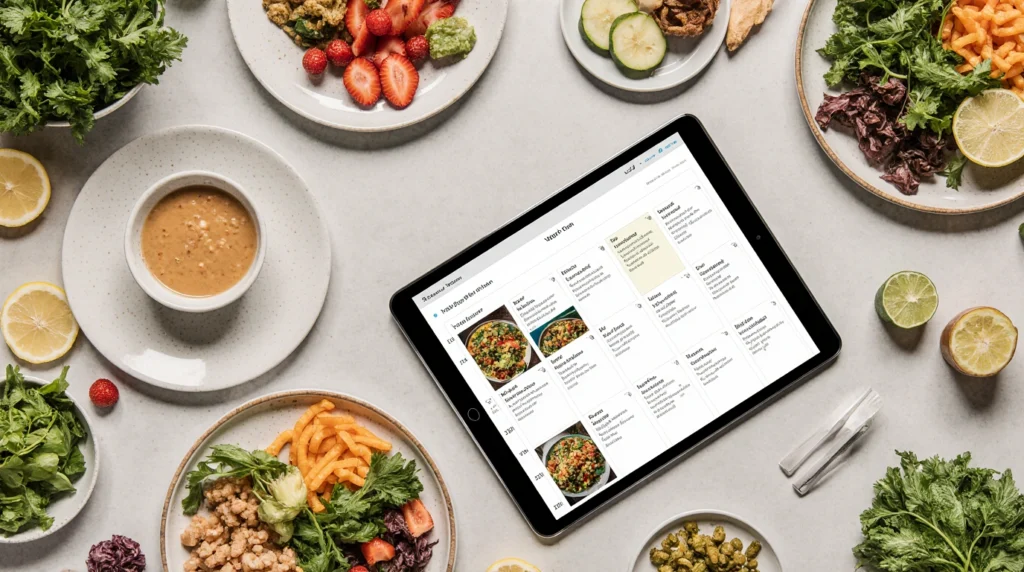
Nutrition is perhaps the most mature and impactful area of AI for wellness. For decades, the approach has been manual and often tedious—counting calories, tracking macros, and following rigid diet plans. AI reshapes this entire experience, turning what was once a chore into an interactive and intelligent guide for the user.
From Calorie Counting to Hyper-Personalized Plans
The first wave of AI for nutrition and fitness focused on simple automation, like scanning a barcode to log food. The current wave is far more sophisticated. Modern AI can analyze a photo of your meal to estimate its nutritional content, but its real power lies in synthesis. By providing an AI with your goals, preferences, and biometric data, you can generate a complete, day-by-day eating plan in minutes. This plan isn’t generic; it can be tailored to your exact tastes, budget, and schedule. It represents a paradigm shift from simply tracking data to receiving actionable, personalized guidance.
For those ready to dive deep and create their own plan from scratch, we’ve created a dedicated tutorial. You can learn the exact steps in our A Beginner’s Guide: How to Create a Custom Meal Plan with AI.
The Role of AI in Your Mental Health

Applying artificial intelligence to mental wellness is an area of incredible potential, though it requires a careful approach. While these tools are not meant to replace professional therapists, they are becoming valuable allies for navigating the stresses of modern life. They provide a confidential, easily accessible, and judgment-free environment where users can practice self-reflection and cultivate healthier mental habits. This state of mental clarity is also a cornerstone of personal efficiency. You can explore this connection further in our guide on AI prompts for productivity.
An Accessible Partner for Mindfulness and Stress Relief
The key advantage of an AI mental health tool is its 24/7 availability. Stress and anxiety don’t adhere to a 9-to-5 schedule. AI chatbots, equipped with principles from Cognitive Behavioral Therapy (CBT) and mindfulness, can guide users through difficult moments as they happen. They can help users identify and challenge negative thought patterns, lead them through grounding exercises, or facilitate a “brain dump” to declutter a worried mind. This immediate support can be crucial for preventing stress from escalating.
We’ve explored this in-depth, providing specific, actionable techniques. To see how you can turn a simple chatbot into a powerful ally, explore our guide: 5 Powerful AI Prompts for Immediate Stress Relief.
Finding the Right Tools: The Best AI Apps for Your Wellness Journey
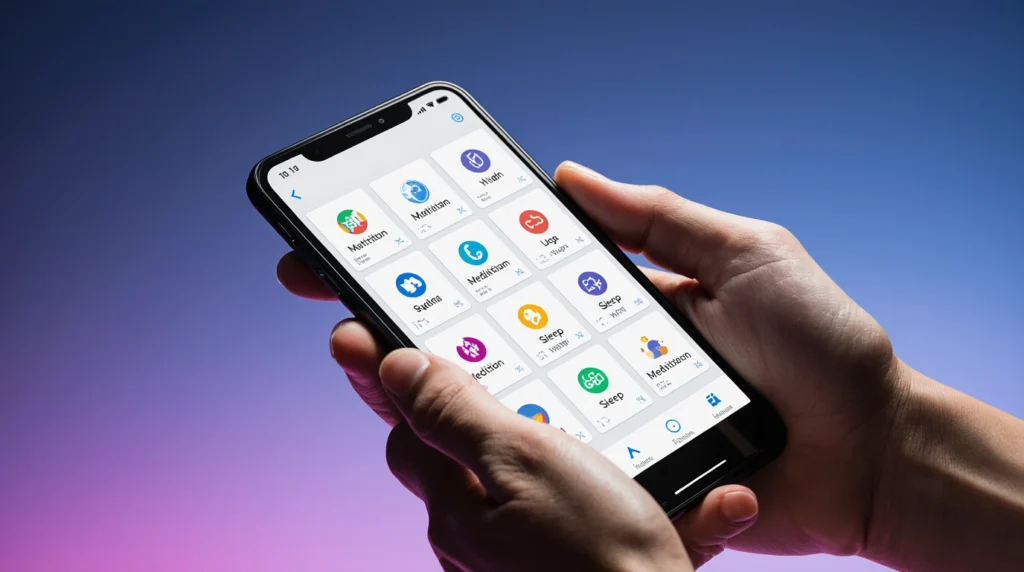
The wellness market is flooded with thousands of apps, making it difficult to find the ones that are truly intelligent. The best platforms leverage AI not just as a gimmick, but as a core component of their value proposition, using it to analyze data and provide truly personal insights.
From Symptom Checkers to Fitness Coaches
The landscape of AI wellness tools is incredibly broad. It features AI-powered symptom checkers like Ada Health, which helps users make more informed decisions about seeking medical care. The range includes smart nutrition trackers such as MyFitnessPal that use AI to simplify food logging, and mental health apps like Calm that recommend personalized meditations.
In fitness, wearables like Whoop act as an AI sleep tracker and recovery coach, suggesting how hard to train based on your body’s readiness. With such a diverse selection, the best tool is the one that aligns with your individual health objectives.
To help you navigate this complex landscape, we’ve tested and analyzed the top contenders. For a detailed breakdown of our top picks, read our comprehensive review: The 5 Best AI Wellness Tools to Try in 2025.
Optimizing Your Fitness and Physical Performance with AI
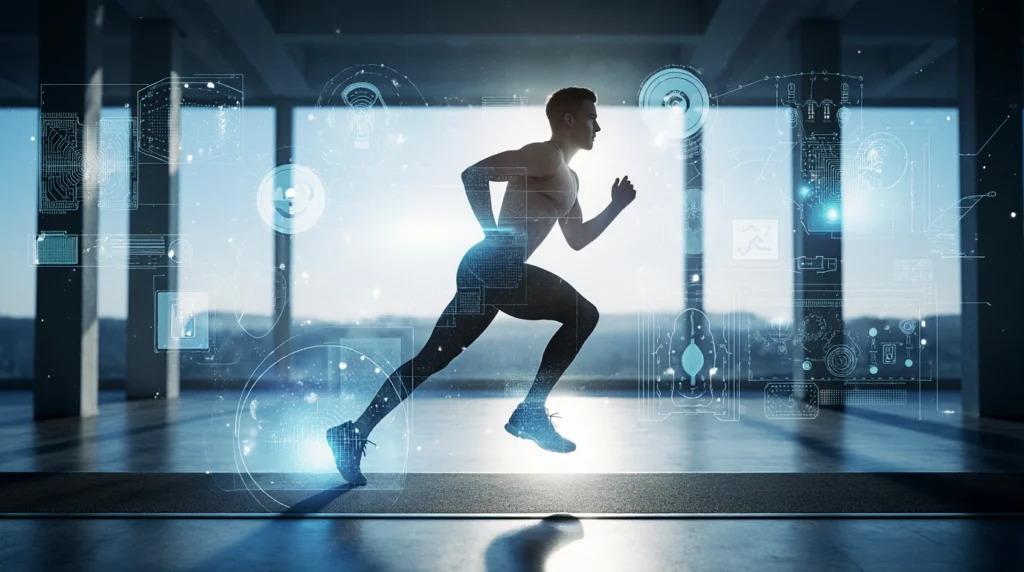
The concept of an AI fitness coach is rapidly moving from science fiction to reality. By analyzing data from wearables—heart rate, heart rate variability (HRV), motion, and sleep—AI can create dynamic training plans that adapt to your body’s daily condition. This is a significant leap from static, pre-written workout programs.
Your AI-Powered Personal Trainer
Imagine a personal trainer that knows you didn’t sleep well and, in response, automatically reduces your workout’s intensity to prevent overtraining and injury. This scenario showcases the personalized potential of artificial intelligence in fitness. AI can suggest specific exercises to meet your goals, demonstrate correct form, and even adjust your weekly schedule according to your recovery levels. For those who prefer to design their own plan, a chatbot can be prompted to generate highly specific routines for any objective, from running a 5K to building muscle at home.
This area is so exciting that we’ve created a dedicated guide. You can learn how to create specific routines in our article: Your AI Personal Trainer: 7 Prompts for a Better Workout.
The New Frontier: AI for Better Sleep and Recovery
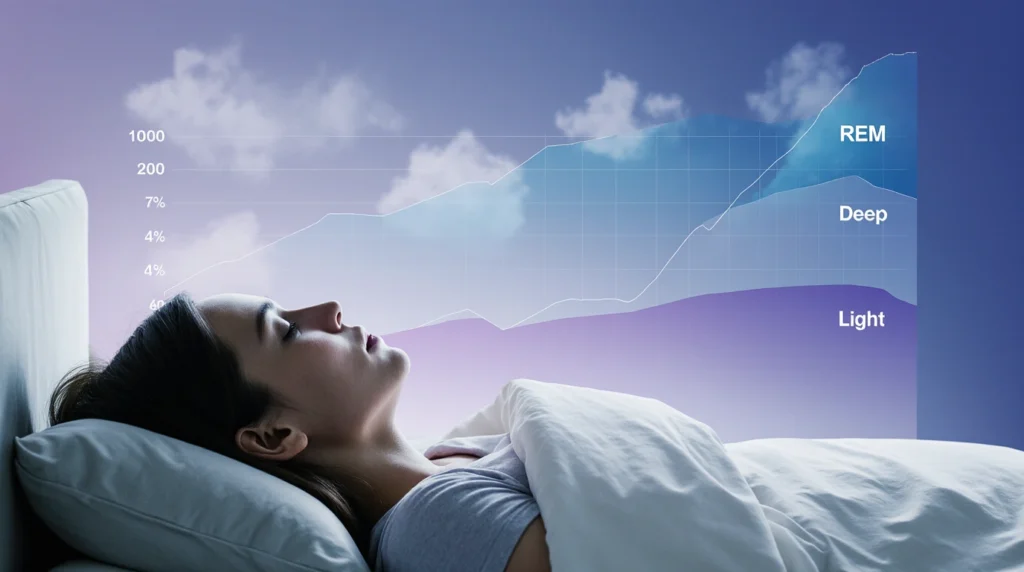
Sleep is arguably the single most important pillar of wellness, and it’s an area where AI is making profound impacts. For years, sleep tracking was limited to measuring duration. Today’s AI-powered wearables can analyze the quality of your sleep by tracking your sleep stages (Light, Deep, REM) and disturbances.
Decoding Your Sleep Patterns
Advanced AI sleep tracker systems do more than just present data; they interpret it. They can identify patterns and correlate them with your daily habits. For instance, an AI might find that your deep sleep decreases on days you consume caffeine after 2 PM or that a late-night workout negatively impacts your REM sleep. By providing these personalized insights, AI helps you understand the hidden variables affecting your energy and recovery, allowing you to make targeted lifestyle changes for better sleep. For a detailed look at the key metrics, read our complete guide: Unlock Better Sleep: A Guide to Using AI for Recovery.
The Future and Ethics of AI in Healthcare

The trajectory of AI for wellness is undeniably exciting, but it’s not without its challenges. The future of health AI holds the promise of preventative care, hyper-personalized medicine, and radically accessible wellness coaching.
However, it also raises critical ethical questions about data privacy, algorithmic bias, and the risk of over-reliance on technology for medical advice. According to a report from the Stanford Institute for Human-Centered AI (HAI), establishing robust ethical guidelines and ensuring transparency are paramount as these technologies become more integrated into our lives. The responsibility lies with both developers to create safe and unbiased tools, and with users to see them as powerful supplements to, not replacements for, professional human expertise. To understand these challenges in greater detail, it is essential to read our deep dive into the risks of AI in healthcare, including privacy, bias, and what to watch out for.
How to Get Started on Your AI Wellness Journey Today
Getting started with AI for wellness doesn’t require a degree in computer science. In fact, you can begin your journey in the next five minutes with tools you already have.
- Lasting change is built gradually, not by trying to transform your life all at once. Concentrate on one specific domain you wish to improve, whether it’s your nutrition, stress management, or fitness level.
- Use a General Tool: Open a chatbot like ChatGPT or Gemini. You don’t need a fancy, paid app to start.
- Use a Specific Prompt: Use one of the prompts from our dedicated guides. Be specific about your goal and personal context.
- Iterate and Refine: Engage in a conversation with the AI. Ask for changes and adjustments. The more you interact, the better the results will be.
The most important step is simply to start. Experiment, be curious, and see how this powerful technology can become a partner in your personal health journey.
Frequently Asked Questions (FAQ)
Is AI for wellness expensive?
It doesn’t have to be. While some dedicated hardware (like Whoop) requires a subscription, many of the most powerful strategies can be implemented for free using general-purpose AI chatbots like ChatGPT and Google Gemini. Many specialized apps also offer robust free versions.
What’s the difference between AI in wellness and medical AI?
AI for wellness focuses on empowering individuals to manage their lifestyle, fitness, nutrition, and general well-being. It is proactive and generally used outside of a clinical setting. Medical AI is used by healthcare professionals for tasks like diagnosing diseases from scans, predicting patient outcomes, and discovering new drugs. The former is a coaching tool; the latter is a clinical one.
How much technical skill do I need to start?
Virtually none. If you can write a text message or an email, you can write a prompt. The key skill isn’t technical; it’s learning to communicate your goals and context clearly. Our website is dedicated to teaching you exactly that.

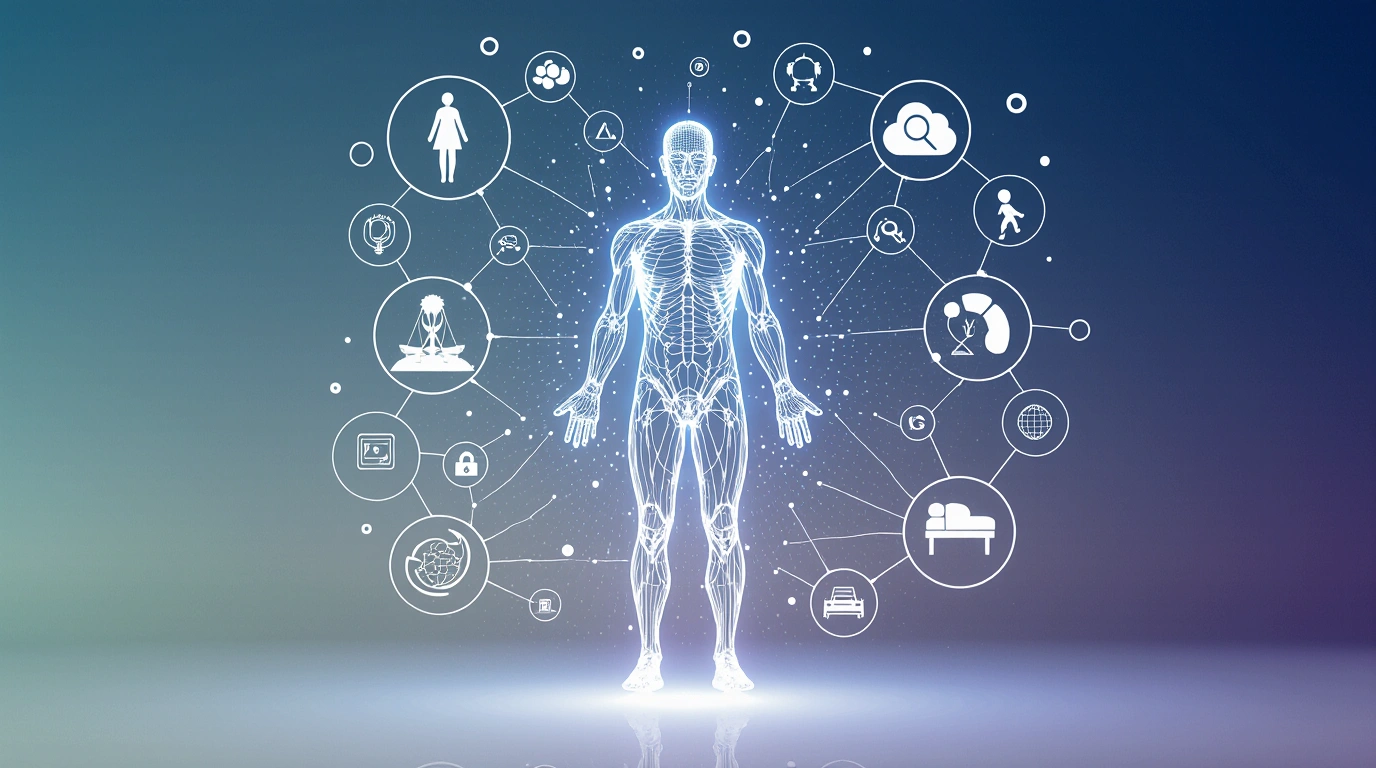


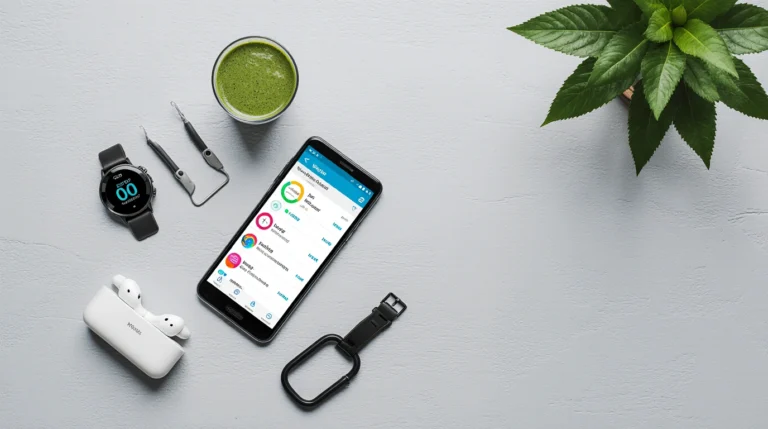



12 Comments